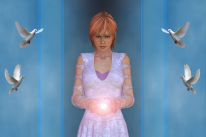
“To forgive is to set a prisoner free and realize that prisoner was you.” ~Lewis B. Smedes
When someone you care about hurts you in some way, most people tell you that to move on, you have to forgive.
They say forgiveness is a gift you give to yourself. You have to understand what happened from their point of view. Life is too short to hold a grudge or be angry.
Well, what if you do all that?
You forgive. You understand that they really didn’t mean to hurt you or if they did mean to, you understand where they were coming from.
You seek to let go for your own sake, your own peace of mind.
And it still doesn’t work.
You still hurt.
That’s where I was.
My parents divorced when I was a toddler. As I grew older, I rarely saw him. I mostly tricked myself into believing that I didn’t care, but it hurt. I didn’t feel loveable or worth the effort, and it colored my future relationships with men.
As part of my healing journey, I sought out talk therapy. During one session, my father’s absence came up as a topic. It was during that time that I allowed myself to even consider some form of reconnection.
I decided to write my father a letter, sharing how hurt I felt by his absence and asking all of the questions I always wanted to know. That letter started a reconciliation process that has been under way for the past few years.
As we got to know each other better, I got to understand why he didn’t come around and what he was going through.
And when my grandfather died in April, 2014, I got to learn even more about my father’s upbringing and feel compassion for the little boy that he was and how the things he went through led him to become the man he became, including him not being around as my father.
But something still wasn’t right. I tried to reason away my feelings of pain, anger, and hurt.
“If you had the same kind of upbringing that he did, you probably would have done the same thing. His absence had nothing to do with you or your worthiness as a person. That’s all in the past, just let it go.”
But that didn’t help me. I was missing something, so I set out to find it. I read, I wrote, I cried, I punched my mattress, and ultimately discovered two things that were missing that may help you too.
First, I needed to grieve.
The adult me needed to allow that little girl in me to mourn what was lost. I never got to know what it feels like to be loved by a man as a little girl.
Somewhere in me I was holding out hope that by reconciling with him, I would fill those needs, but those moments are gone; there is no way that I can completely fill that void as an adult. I had to mourn the loss.
When we think about mourning, we most often think of death. There are many other losses in life that we need to mourn—loss of health or a relationship or a job, and I would add to that loss of a relationship you wish you had.
When we forgive someone and try to maintain a relationship with them post-forgiveness, it is tempting to try to get what we didn’t get before. It’s like we’re trying to redo the past in the present, when the past is gone. All this does is cause more suffering.
What we’re building with this person is new. We must mourn what we didn’t get, mourn what we wanted, that’s the only way to start letting it go.
And by let it go, I don’t mean that how you feel disappears. I mean that we no longer let it lead our lives in the present even if the feelings are still faintly there.
There are as many ways to grieve as there are people. If it works for you, do it. You might try:
- Crying
- Writing (journaling, letters that you didn’t send, poetry)
- Watching movies and listening to songs that help bring out deep feelings
- Talking to a therapist
- Finding healthy ways to release anger (punching your mattress, boxing, screaming into a pillow)
- Reading helpful books
Mourning is a process that takes time and can’t be rushed. It’s best done in a spirit of allowing whatever comes up, without judgment and with great self-care. The more I really allowed myself to grieve and truly feel everything I’d been holding onto, the better I felt.
In addition to mourning, the second thing I did was to find ways to fill the needs I still had within that I was looking to my father (and other people in my life) to fill.
Forgiveness and reconciliation should involve open communication of what is needed to move forward with the relationship and a stated commitment from the person who did wrong to change their behavior in a positive way.
With that said, there are certain things that we need to feel good as humans that we need to give to ourselves and cannot outsource to others, especially if we want to avoid suffering.
We must take responsibility for the following things:
- Our level of self-love and acceptance
- Our belief in our own inherent worth and deservingness of good things
- How we feel (emotionally and physically) in a given moment
- The direction our life is going and how we choose to respond to what happens.
We can trick ourselves in the short term to believe that other people make or break these things, but we are the only ones who can make lasting change in these areas.
Reconciling with someone will not change these things in a sustainable way.
Reconnecting with a parent will not make you love yourself more. Reconnecting with a partner will not make you feel like you deserve good things. You may get a boost of good feelings for a little while, but they won’t last without you dedicating the time and effort it takes to build yourself up from the inside.
This may feel daunting, but you don’t have to make these changes overnight. Baby steps are not just for babies; they can make a huge difference in your life when taken consistently.
Taking responsibility for your life and how you feel about yourself is worth the effort, especially when you consider that you are the one person you spend the most time with every day. Why not make that relationship the best it can be?
And if you feel like you’ve been unloving to yourself and don’t know where to begin, one of my favorite exercises I use to help me figure out where to start is to ask “What actions would someone who loved themselves take?” Use your answers to give you a list of first steps and commit to taking one today.
This may also feel unfair. You might think, “Why do I have to work on myself? I wasn’t the one who did anything wrong!” Just think how powerful you will be when you are not bound by the whims of another person.
If your friend chooses to be hurtful and you get all your feelings of worth from that friend, then what? That seems like the less fair option.
I’ve come to believe that the purpose of forgiveness is freedom. Freedom to love yourself and others again (or for the first time) and freedom to live from a place of power. I hope that what I’ve shared helps you continually free yourself.
Isolated man image via Shutterstock
About Varonica Frye
Varonica is a writer and coach who believes that we don’t have to let fear stop us from being our true selves and doing whatever our heart is calling us to do. Visit her at hugyourfear.com to get the free guide, 10 Ways to Be Stronger than Your Fear.













 Though I run this site, it is not mine. It's ours. It's not about me. It's about us. Your stories and your wisdom are just as meaningful as mine.
Though I run this site, it is not mine. It's ours. It's not about me. It's about us. Your stories and your wisdom are just as meaningful as mine. 